|
 
IN
THE NEWS | CALENDAR
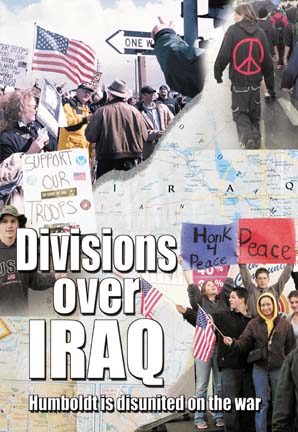
by KEITH EASTHOUSE
Sidebar: High
school students march for peace
But some express support for the war
WITH AMERICAN AND BRITISH forces
making dramatic gains every day -- and with the possibility that
Saddam Hussein and his two sons were killed in a bombing raid
Monday -- the debate over the war in Iraq is fast becoming moot.
Like it or not, a military government
headed by a United States general will soon be calling the shots
in the battered Middle Eastern country, much like the provisional
government headed by Douglas MacArthur that was set up in Japan
at the end of World War II. After a six-and-a-half-year occupation,
MacArthur and his assistants packed their bags and left, leaving
behind something new: a fledgling democratic government in a
country without any democratic traditions.
That government persists to
this day, as do the American military bases established during
MacArthur's reign, the bulk of which are concentrated off the
Japanese mainland on the island of Okinawa.
A similar future is envisioned
for Iraq, although there are critical differences between that
country today and Japan in 1945 -- a key one being that the Japanese
people accepted MacArthur because he had been endorsed by the
Japanese emperor; there is no such figure in Iraq to give whoever
heads the military government there a similar imprimatur. Also,
the Japanese had surrendered unconditionally, while the Iraqis
are not likely to; and Iraq, riven by age-old ethnic and religious
animosities, is a much less cohesive country than Japan was.
All of which suggests that the
peace in Iraq may be more difficult than the war. Nonetheless,
there's no disputing that this is a watershed moment in world
history: America now has a new military beachhead in the Middle
East. There's also no disputing that the way in which the Bush
administration achieved this has been controversial both abroad
and at home. Here in Humboldt people are still struggling to
come to terms with what has happened in the past days, weeks
and months. And while virtually everyone supports American troops,
people are divided about the wisdom of this war, not to mention
its legality and morality. What follows are brief snapshots of
the views of some community members.
"I am not for war,"
said MariLou Renner. "But I feel peace comes at a price."
Renner should know. Her oldest boy, Cameron, is in Iraq right
now. He's a logistics officer in the 3rd batallion, 2nd Marine
division. She and her husband, Mike Renner, owner of Renner Petroleum,
believe that Cameron is presently somewhere south of Baghdad.
They talked to him on the telephone on March 15, when he was
in Kuwait, prior to the invasion. And he wrote them a letter
two days later. Since then, silence. Which isn't really surprising.
As MariLou Renner put it: "There's no way he can take time
to sit down and write a letter because he's fighting for his
life."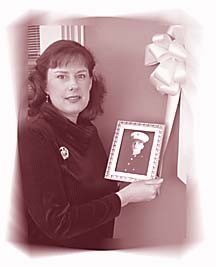
That, of course, is just it.
Her son is in harm's way, and like every loving mother her instinct
is to protect him, never mind that he's a fully grown, 25-year-old
adult. Given the fact that he's on the other side of the world,
she can't. So MariLou Renner is having to endure an exquisite
kind of torture that only the parents of soldiers at war -- perhaps
only the mothers of those men and women -- can fully understand.
"I've had a nervous kind of feeling before, but I don't
think I've ever had this kind of feeling before. It's very, very
nerve-wracking. I just get a feeling in the pit of my stomach.
It's almost like my heart is being torn out." At another
point she said something that revealed a fundamental truth about
parenthood: No matter what the situation, you feel responsible
for your children. "I feel like I'm taking my first son
and sacrificing him," Renner said. "In a way, every
day is a death."
[left, MariLou
Renner and her son Cameron]
Renner and her husband have
had good cause to be worried: Cameron was involved in some of
the fiercest fighting of the war to date, the firefights in and
around Nasiriya, an urban center in central Iraq. She knows that
he survived because a colonel recently sent an e-mail to his
own wife at the Marine's Camp Lejune base in North Carolina that
said everyone in Cameron's division survived; the colonel's wife,
in turn, passed along the e-mail to the troops' wives.
Cameron, a graduate of St. Bernard
Catholic School in Eureka, met his wife, Sarah, at Oregon State
University in Corvallis, where they were both students. An all-around
athlete and student body president in high school, Cameron studied
business and animal science at Oregon State and had planned on
being a large animal veterinarian. But then an aptitude test
he took in college showed that he was strongly suited for the
military, and Cameron switched direction.
"It was a shock to my life
when he went into the military," his mother recalled. "But
when I looked back on him as a little child, I wasn't really
surprised. He was always a real spiritual child, very loving
and compassionate. But he always had a really determined, strong
side, too."
Cameron has a child of his own,
a 9-month-old girl named Scarlet. In his letter in March he talked
of missing her, and made reference to the fear many soldiers
have: that the things they see and have to do in combat will
somehow make them fearsome to their loved ones when they return.
"I hope she is not afraid of me or anything," he wrote.
Cameron's mother's greatest
fear is obvious. Given the military's practice of personally
informing loved ones of combat fatalities, Renner said that if
someone were to knock on her door in the middle of the night
for no good reason, "I would probably choke them."
She also expressed frustration at anti-war protesters, who have
been fairly visible in both Eureka and Arcata. She said they
are "angry," not peaceful, and have a "political
agenda."
"I don't have trouble with
the Women in Black," she went on, "because they are
truly praying and standing for peace. Praying for our boys and
peace -- that's a peace march to me."
Bud Tillinghast, a retired United Methodist minister, is opposed
to the war. But he said he also supports the troops.
"People who support the
war assume that people who are against the war are not concerned
for our American troops. But attempting to divide the community
in terms of anti-war and anti-troops is a false dichotomy that
only hurts everyone.
"Religious leaders who
have to deal with families who have lost sons and daughters are
sensitive to the concerns of families for the safety of their
children," he added.
Tillinghast, along with about
30 other local religious leaders, endorsed an advertisement for
the March 15 "peace march" in Eureka that appeared
in local newspapers. Now he said he wants to join with local
veterans' groups "to plan a welcome back for our troops
when they return."
The minister said his opposition
to the war stems from his belief that it is immoral. For a war
to be just, he said, "it should be the last resort."
In this case, President Bush did not try to avoid war; quite
the opposite. As a result, the whole diplomatic saga at the United
Nations, in Tillinghast's view, was nothing more than a sham.
"Despite taking this to the U.N., a decision had already
been reached by the administration and the neo-conservatives
to change the complexion of the Middle East."
Tillinghast said the war was
immoral for another reason: It violates the principle of proportionality
because the United States is using overwhelming force on a comparatively
weak nation.
Tillinghast said he genuinely
believes the president is what he proclaims to be: a devout Christian.
But he said Bush is a Christian "in the tradition of the
Crusades, where the world is divided between those who are good
and those who are evil.
"For me, the line between
good and evil goes through the human heart; it is not an external
thing. Therefore, we are all involved with good and evil. With
good intentions, I can do evil things."
Abdul Aziz, a Humboldt State University business professor
who was born in Pakistan, is also troubled by this war. Doubly
troubled, actually, since his faith -- Islam -- demands two things
of him: loyalty to his country, which in his case is America
since he is a U.S. citizen; and loyalty to all Muslims everywhere.
"There's a saying of the
prophet Mohammed," Aziz said. "Two Muslims are like
two fingers of the same hand; when one hurts, the other will
feel the pain.
"So the Muslim community
is torn," Aziz went on. "Muslim-Americans are feeling
the pain right now because so many Iraqi civilians are getting
killed. But at the same time we are citizens of the U.S.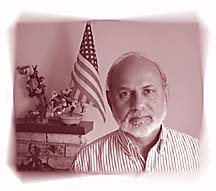
"It's very hard,"
he added. "How do I support the troops when I don't like
the war? I keep praying."
Like Tillinghast, Aziz believes
President Bush deliberately pushed for war. He also expressed
deep skepticism about one of the justifications offered by the
president: the need to deter future terrorist attacks on the
United States.
"This preemption can lead
us to a path of fighting many more wars. It can also encourage
other strong nations to start wars with weaker nations."
Aziz expressed concern that the example of the war in Iraq could
cause India to attack his native Pakistan over the Kashmir, long
a disputed area between the two nuclear-armed South Asian countries.
He also said that Israel could look to the Iraq war as justification
for taking preemptive action against Palestinians to prevent
suicide bombings. Finally, he said many countries in Africa,
a chronically unstable area, could use the doctrine of preemption
to wage war on their neighbors. "The preemption principle
itself could lead to world chaos," Aziz warned.
Like Aziz, Saeed Mortazavi is
a professor in the business school at HSU and a U.S. citizen.
Unlike Aziz, he is an Iranian by bir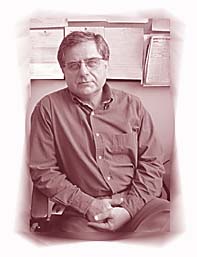 th,
and, as such, is worried that his home country might be America's
next target. th,
and, as such, is worried that his home country might be America's
next target.
For one thing, Iran shares a
lengthy border with Iraq. For another, Iran is one of three countries
-- along with Iraq and North Korea -- that President Bush has
described as comprising an "axis of evil."
Mortazavi has no love for Iraq
or Saddam Hussein. "This is a regime that fought against
Iran for eight years [in the 1980s] and killed about a million
Iranians." Mortazavi pointed out something else: The United
States assisted Hussein in that war, both in terms of intelligence
and in terms of military technology.
Mortazavi said the warnings
the Bush administration issued last week to Syria and Iran about
coming to Iraq's aid are merely the latest in a string of negative
statements directed at Iran. Before Iran was part of the axis
of evil, it was deemed a rogue nation by American officials.
Mortazavi said that if derogatory
characterizations of a country are used to prod the government
in power to move in the right direction, that's one thing. But
if they "are used in a military sense to dehumanize the
country so it can become a military target, then there is a significant
problem with that."
Mortazavi said "there is
no good justification for military action against Iran.
"Iran is a developing democracy.
Iranians should be given a chance to reach their own democratic
solution without the intervention of other countries."
Jerry Partain bristles at the suggestion that the United States
is on the brink of a binge of conquest. "I can't go along
with people who say we are at the beginning phase of an imperialist
mode. It makes no damn sense.
"I don't see any evidence
or believe that the United States is ready to go into North Korea
and Iran," he added.
He said attacking Iraq was justified,
in part, because Saddam Hussein is such a cruel tyrant. Because
of America's might, he said it would have been less defensible
to have done nothing and allowed him to remain in power. "I
don't see how we could keep from doing something given the way
he's abused his own people.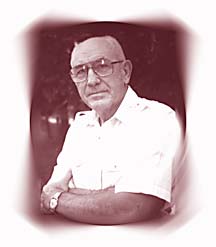 " "
He also doesn't think, as some
do, that the real motivation behind the war is to gain control
of Iraq's huge oil fields. "Hell no," he said when
asked. "We could have taken all the oil fields we wanted
in `91 [during the Gulf War] when we had 200,000 troops over
there."
Partain is a retired HSU forestry
professor. He served as the head of the California Department
of Forestry and Fire Protection from 1982 to 1989. He has traveled
extensively, visiting 64 countries, and is one of the more articulate
conservative voices in Humboldt County.
He said he was not surprised
at the resistance the Bush administration encountered at the
U.N. in the weeks leading up to the war. "That's been the
problem with the U.N. all these years. They talk a lot. They
write a lot. They spend a lot of time in hotels and bars. But
they are very shy on doing anything."
He said the opposition had much
to do with jealousy of American power, particularly on the part
of the French. "That's what was really goading them. They're
descending rapidly on the scale of real producers and they don't
like it." Partain said jealousy is also the root cause of
Arab resentment toward America.
But then won't attacking Iraq
fan the flames of resentment further and produce, as the Egyptian
leader Hosni Mubarak put it, "a hundred Bin Ladens?"
Partain said no, that American
strength would deter attacks. "They'll be less likely to
attack a strong horse," said Partain, who believes that
avoiding problems is what causes things to fester. "The
Clinton administration avoided lots of problems and things got
worse." One thing Partain said the Bush administration shouldn't
avoid is the Israeli-Palestinian issue.
"We need to get Israel
to accept a Palestinian state and get that established. That
would do more for stability in the Middle East than anything
else."
Paul Blank, an HSU geography professor, is perhaps the rarest
of birds in this debate: someone who, by his own account, is
on "both sides of the issue."
A fluent Arabic speaker who
lived in Cairo in the 1970s and 1980s, Blank is both "horrified
by the horror of war and the way the administration has run roughshod
over the international system," and "hoping against
hope that the war will effect change for the good in a situation
where the status quo is unacceptable."
Like Partain, he believes that
the Bush administration must now follow up and resolve the festering
Israeli-Palestinian conflict. "I'm not optimistic, but I'm
prepared to be pleasantly surprised."
Melanie Williams, an HSU political science professor, said that
the Iraq war is one more example of a growing divide among Americans
that can be traced to the disputed 2000 presidential election.
"George Bush says he's a unifier, but he keeps renting us
asunder." Whether it's the war, his budget proposals, civil
liberties, or international agreements, the president through
his actions keeps "showing the deep ideological divisions"
within the country.
Mike Harvey, county chairman
of the Republican Party, said "Frankly, it's not the time
to debate the war, but a time to support and send prayers to
our troops and their families. In fact, it's a time to send prayers
to the millions of innocent Iraqi civilians."
Eureka Mayor Peter La Vallee,
who opposes the war, said
the whole debate about Iraq has left a sour taste in his mouth.
"I'm tired of being told that the federal government has
all the answers and that I'm unpatriotic if I question [the war]."
David Meserve, an Arcata city council member who believes the
United States is bent on economic and military domination of
the planet, said he's felt a real sense of "powerlessness
and despair" since the war broke out.
He said he's particularly bothered
that Americans "are getting so hated in the rest of the
world.
"I don't feel as safe to
travel as I used to," Meserve said. "I feel like I'm
going to have to wear a sign on my back saying `I'm an American
but I disagree with my government.'"
Hugo Papstein, owner of two local talk radio stations -- KINS
and KWSW -- that feature Rush Limbaugh, said the vociferousness
of anti-war protesters in the Humboldt Bay region is misleading
-- most people, "a silent majority," are for the war.
"The people I talk to are certainly supportive of the war
effort and understand why it was necessary," Papstein said.
He remarked that he saw an "awful lot of support" at
the recent jazz festival. "There were standing ovations
every time a patriotic song was played," he said.
High
school students march for peace
But some express support for the war
by
BOB DORAN
ON A CLOUDY MORNING LAST WEEK,
just after the end of first period, a group of students began
assembling in front of Eureka High. American flags were pulled
from backpacks; a few kids held hand-lettered signs. One identified
the group as "EHS Students for peace." Another asked,
"How many lives will it take to end this war?" Yet
another boiled the issue down to a single word: "Death?"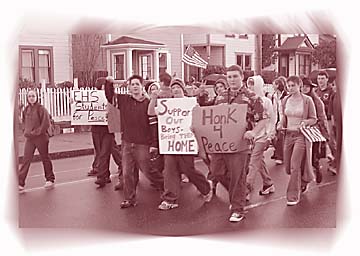
Within minutes about 100 teenagers
set out en masse, walking briskly toward the county courthouse.
At the front of the crowd, Brandon Moore, age 16, one of the
students who organized the walkout, held a red sign marked with
a large peace symbol.
"I felt that we needed
to do something to show that the student body has a voice,"
said this clean-cut sophomore, who was wearing a tie. "We
need to say how we feel to show people what we want for our generation.
We want peace."
[right, Eureka
High students march down J Street.]
When the school administration
got wind of the walkout they proposed an alternative -- a school
assembly where students could air their views on the war.
Moore said he and the other
organizers felt the administration was "trying to downsize
our voice and our opinions. It seemed like they weren't taking
us seriously and wanted to control what we wanted to say."
When administration officials
saw that the students weren't going to back down, they circulated
a memo warning that anyone who left class would be punished.
"If I get in trouble I'll accept it," Moore said. "If
I get suspended I'll pin the notice on my shirt and let people
know that I got in trouble for what I believe in."
Moore said he hoped the assembly
would still take place. "We want to have student speakers
pro and con, plus a panel with speakers from Veterans for Peace
and Women in Black along with speakers from recruitment offices
and local people who have family members over in the war right
now. We want students to be able see what the different opinions
are and maybe learn something that might further their knowledge.
"We can't just sit back,"
he went on. "What's happening right now will affect our
lives when we grow older."
As the students made their way
down J Street, one marched apart from the rest. Matt Knudsen,
a junior dressed in desert brown camouflage pants and a USA sweatshirt,
held a sign saying "Support Our Troops." A campaign
button on his hat declared his support for President Bush and
Vice-President Cheney.
"I'm protesting the protesters,"
he explained. "I didn't want to cut class, but somebody
has to be out here to protest what they're doing. I think we
need to support America, and support our troops, even if you
don't agree with the war. The troops are out there defending
our freedom and the freedom of the Iraqi people."
Knudsen assured me that plenty
of students at Eureka High support the war. As if to confirm
that, a girl came up and said she was in favor of military intervention.
"People need to see both sides," she declared.
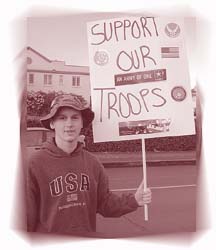 In
her mind the war in Iraq is a matter of self-protection. "The
Iraqis are making biological and chemical weapons. I believe
they could release them all over the United States. It'll be
just like we're animals locked in the pound being put to sleep.
We couldn't escape them," she said with fear in her voice. In
her mind the war in Iraq is a matter of self-protection. "The
Iraqis are making biological and chemical weapons. I believe
they could release them all over the United States. It'll be
just like we're animals locked in the pound being put to sleep.
We couldn't escape them," she said with fear in her voice.
When asked her name, she said
she wanted to remain anonymous. "Both of my parents are
against the war," she explained. "I don't want to get
in trouble."
[left, Matt Knudsen
shows his support for the troops.]
The group assembled on the courthouse
steps for a series of speeches. Student Shamara Wiley started
things off with a call for understanding, reading a speech adapted
from one she delivered at the March 15 peace rally in Eureka.
"I draw most of my inspiration
for Dr. Martin Luther King Jr.," she began. "I'm an
advocate for peace and non-violence. The only way we can stop
the war and stop violence is to change the way we perceive others.
If we perceive others as inferior then it makes it easier to
oppress them. If we perceive others as evil, it makes it easier
to kill them. We must begin to see others as equals, as brothers
and sisters."
At one point two students who
had not been on the march brandished signs with pro-war messages:
"Bombs over Baghdad" and "Turn Iraq into a parking
lot." When the crowd began to rumble with jeers, Moore silenced
them saying, "Respect their opinions. They have the right
to speak."
A furious hailstorm soon pummeled
the crowd, forcing many to seek shelter under a courthouse overhang.
"I'm not part of the protest,
I'm for [the] war," said Jessica, a 15-year-old sophomore,
over the cloudburst. "I think Saddam Hussein is a very bad
leader; his people are afraid of him. So I think we should defeat
Saddam Hussein. He has no right to hurt his people that way."
"Most of the people that
we fought so far just gave up because they're afraid of Saddam
Hussein," added her friend Aubrey, also 15. "They don't
want to die for him."
So are we fighting the war to
help the Iraqis? "Not really," said Aubrey, turning
pragmatic. "We need the oil. If we don't fight this war
they'll find some reason not to give it to us."
The hail dispersed most of the
crowd; some sought warmth inside the courthouse and used their
cell phones to try to find a ride back to school. Outside, the
remaining protesters moved to the street corner where they waved
signs urging passing motorists to honk for peace. A couple of
students battled playfully with hail "snowballs."
The die-hards were still gathered
in a small crowd. Moore stood in the middle clutching what was
left of the "EHS Students for Peace" sign. Soaked by
the rain, most of it had fallen away. All that remained was a
small rectangle that said "Peace."
IN
THE NEWS | CALENDAR
Comments?

© Copyright 2003, North Coast Journal,
Inc.
|